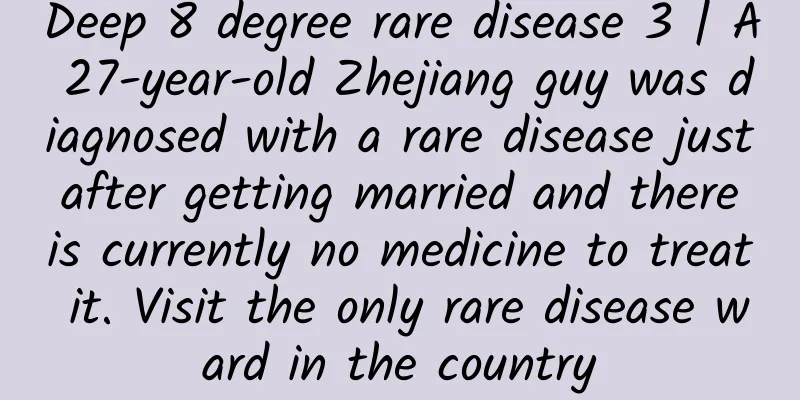Deep 8 degree rare disease 3 | A 27-year-old Zhejiang guy was diagnosed with a rare disease just after getting married and there is currently no medicine to treat it. Visit the only rare disease ward in the country

|
Ward 5 of the Department of Neurology of the Second Affiliated Hospital of Zhejiang University School of Medicine is a ward dedicated to the treatment of patients with rare diseases. It is also the only "rare disease ward" in the country. In 2015, Professor Wu Zhiying left Huashan Hospital Affiliated to Fudan University, gave up the position of director of the Institute of Neurology of Fudan University which he had held for six years, and came to the Second Affiliated Hospital of Zhejiang University School of Medicine. Professor Wang Jianan, then president of the Second Hospital of Zhejiang University, asked her if she had any requirements. Wu Zhiying said, "I personally don't have any requirements, but I need a ward that can treat patients with rare diseases and genetic diseases, and a laboratory to study rare diseases/genetic diseases." The establishment of the ward is based on practical considerations. On the one hand, patients with rare diseases suffer great pain, and on the other hand, they feel ashamed of having a "strange disease". In addition, it takes several days to see a doctor and get a diagnosis, and it is very inconvenient to eat, live and travel. Many patients leave after one visit to the outpatient clinic, and follow-up is very difficult. Wu Zhiying urgently needs to understand these diseases and hopes to provide accurate diagnosis and treatment for patients. In this way, after 23 years of hard work in rare diseases, Wu Zhiying finally established the rare disease ward of the "Neurology Department 5" at the Second Hospital of Zhejiang University. With the support of both the ward and the research center, it is much more convenient for patients with rare diseases to see a doctor. After admission, most rare diseases can be diagnosed within a week through preliminary genetic screening. "The 121 rare diseases on the 2018 Chinese Rare Disease List are now all under the comprehensive management of wards and research centers," said Wu Zhiying. On the morning of September 9, a reporter from Metropolitan Express arrived at Building 7 of the Second Hospital of Zhejiang University and took the elevator to the 6th floor, where the Fifth Ward of the Department of Neurology is located. Huntington's disease, hepatolenticular degeneration, spinocerebellar ataxia, amyotrophic lateral sclerosis... many diseases that many people have never even heard of are not uncommon in this ward. There are 24 beds in the ward, and currently there are 23 patients with rare diseases. The oldest of these patients is 67 years old and the youngest is only 10 years old. Let us get to know some of the patients in this ward. Grandma and mother passed away early My 30-year-old sister also started to suffer from the disease two years ago. Wang Yi, a 27-year-old patient with spinocerebellar ataxia Can we wait until the day when a specific medicine is developed? Wang Yi, a 27-year-old Zhejiang boy, does not look like a patient. He is tall and straight, with neat short hair and sportswear, and looks sunny and handsome. But only he knows that the fate of him and his family seems to be unable to escape the clutches of the disease. He remembered that when he was seven or eight years old, he saw his mother swaying when she walked, but she was able to control herself at that time. When he was about eleven years old, his mother often fell to the ground because of unstable walking. As the disease worsened, when his mother was 36 years old, she could only stay in bed for a long time, and her speech gradually became unclear. Later, even eating became difficult, and she often couldn't swallow a mouthful of rice in her mouth... At the age of 46, his mother passed away. Wang Yi has never met his grandmother, who died before he was born. It is said that when she was alive, she had symptoms similar to his mother's. No one knew what disease they had. Then, the same symptoms appeared in his sister. "My sister is three years older than me. She started walking unsteadily last year. Later, through genetic testing, she was diagnosed with spinocerebellar ataxia. Now she walks unsteadily and cannot walk independently. She has quit her job and is staying at home." Having seen his mother suffer from illness and his sister not being spared, he made a special trip to Zhejiang University Second Hospital to undergo a genetic diagnosis to find out whether he also suffered from "spinocerebellar ataxia." What made him make this decision was that he was getting married this year. "I don't want my children to repeat the same fate in the future," Wang Yi said. Spinocerebellar ataxia is an autosomal dominant disease, which means that if one of the parents is a carrier of the gene, there is a 1/2 chance that the disease will be passed on to the next generation. What's worse, there is currently no specific drug for this disease. Wang Yi said, "My sister gave birth to a child more than 10 years ago. She had not yet developed the disease at that time and she did not know she had this genetic disease. She gave birth to the child through natural conception. Fortunately, through genetic testing, the child did not inherit the disease." But Wang Yi didn't want to take the risk, so he wanted to confirm whether he also had the disease. The next day, Wang Yi's genetic test results came out - spinocerebellar ataxia type 3. Wang Yi seemed calm about the result, as if he had been mentally prepared. He asked the doctor, if he had in vitro fertilization, would the gene not be passed down to the next generation? Doctor Yu Hao from Professor Wu Zhiying's team told him, "With the help of IVF technology, through artificial intervention, healthy embryos can be selected before pregnancy for transplantation and reproduction, which can block the inheritance of disease-causing genes and prevent them from being passed on to the next generation, which is conducive to eugenics." Dr. Yu Hao said that although there is currently no specific drug to treat this disease, paying attention to physical care, diet and daily life, doing more exercises that help to develop balance and coordination, cooperating with the rehabilitation training required for cerebellar atrophy, and practicing persistently will help slow the progression of the disease. Now, what Wang Yi and his family hope most is that the specific medicine for treating spinocerebellar ataxia can be available on the market as soon as possible, bringing hope to him and the patients who are suffering from this disease. Spinocerebellar ataxia A type of hereditary ataxia that mainly affects the cerebellum, brainstem and spinal cord. Its common characteristics are onset in adulthood, with unsteady gait and shaking limbs in the early stages; slurred pronunciation, uneven eye movements, and increased muscle incoordination in the middle stages; and extremely unclear speech in the late stages, affecting breathing and swallowing functions, until death from respiratory failure. **Treatment status: **There is no specific drug and a lack of treatment that can clearly stop the progression of the disease. Finally, the life-saving medicine arrived The annual medical expenses of more than 1.4 million yuan were also included in Zhejiang Medical Insurance Lin Jia, a 29-year-old girl with Pompe disease who weighs 57 catties: As long as you are alive, there is hope that you will see the day of recovery. Lin Jia, 29, is a Pompe disease patient. She was pushed to the hospital in a wheelchair by her mother. She has big eyes, fair skin, and a neat ponytail. Due to severe muscle atrophy, she is only 57 kilograms tall at 1.56 meters, and can be described as "skin and bones". "I'm here to get my second shot." said Lin Jia. "Now that I think about it, my daughter may have been ill when she was very young," said Lin Jia's mother. "She was very thin when she was young, but compared with other children, she was just a little clumsy and ran slower, not much different. It was not until she entered high school that her physical strength gradually became obviously lower than that of ordinary people. She had a hard time walking up the stairs and couldn't even get on the bus. I realized that my daughter might be ill." In order to find out the cause, Lin Jia's mother took her to the hospital for a checkup. "That was ten years ago. There was no genetic testing at the time. The doctor suspected it was 'progressive muscular dystrophy' based on the results of electromyography and other tests. There is no specific drug to treat it." In 2011, Lin Jia graduated from high school and was admitted to a university in Hangzhou. But before she finished her freshman year, she could no longer walk normally and had to drop out of school and go home. Lin Jia's mother used to work in a shopping mall. After her daughter dropped out of school, she quit her job to take care of her at home. "Our house is a self-built house in the countryside, with three floors and no elevator. I usually carry my daughter up and down the stairs, and I need her to help me go to the toilet. I can't live without someone by my side." Although she could no longer go to school, Lin Jia was still full of hope for the future. "When I recover from my illness, I must have a university diploma to find a job." So she signed up for a business administration course online and sat in front of the computer every day to attend classes seriously. After two years of hard work, she got her diploma. But my health was getting worse. In 2014, Lin Jia was rushed to the hospital for emergency treatment due to respiratory failure. The situation was very critical at the time. If it worsened, she would have to go to the ICU for tracheotomy and intubation. Fortunately, Lin Jia survived and was discharged after staying in the general ward of the respiratory department for more than a month. However, she has been dependent on a ventilator since then. Lin Jia remembers clearly that before she was discharged from the hospital and went home, they spent more than 20,000 yuan to buy a non-invasive ventilator. Her beautiful youth had just begun, but her life was firmly "locked" by the ventilator. In the past seven years, her life radius was only as far as the breathing tube could reach. Faced with a seemingly hopeless life, Lin Jia still did not give up. In recent years, she has been looking for the cause of her illness, and has noticed that many drugs for rare diseases have been developed and launched, and several special drugs for rare diseases have been included in medical insurance. In June this year, she found Professor Wu Zhiying. At Professor Wu's suggestion, she underwent a genetic test and was eventually diagnosed with Pompe disease (late-onset), which also solved the real mystery of her "weakness" for many years. As a rare disease, the diagnosis rate of Pompe disease is not high, and many patients are often missed. Currently, there are only more than 100 confirmed Pompe disease patients in my country, and only more than 10 confirmed Pompe disease patients in Zhejiang Province. Fortunately, Pompe disease has been treated with drugs. However, the cost is extremely high. The cost is calculated based on weight. The higher the weight, the greater the dosage and the higher the cost. For example, Lin Jia weighs 57 catties. One injection costs about 60,000 yuan. Two injections are required per month, and the annual treatment cost is as high as 1.44 million yuan. Fortunately, from July 1, 2020, drugs for Pompe disease were officially included in the payment scope of Zhejiang Province's rare disease drug guarantee, which means that more than 10 Pompe disease patients in Zhejiang Province can finally use "life-saving drugs." "This disease not only has a specific drug, but it is also covered by Zhejiang Province's medical insurance. Otherwise, the millions of dollars in annual treatment costs are really unthinkable!" Lin Jia's mother said that she felt very lucky. There are more than 7,000 rare diseases in the world, of which less than 5% can be cured by drugs. She firmly believes that as long as she insists on taking the medicine, her daughter will definitely get better, it just takes some time. On August 23 this year, Lin Jia finally used the "life-saving medicine". As drops of liquid slowly flowed into Lin Jia's body, she and her mother were full of anticipation. In anticipation, she felt that her body had indeed undergone subtle changes, "It seems that I have more strength than before, and my body is much more relaxed than before!" Lin Jia also believes that the days ahead will get better and better, and one day, she will be able to breathe deeply like a normal person and walk freely in the sun. "As long as we are alive, there is hope that we will see the day of recovery," said Lin Jia. Pompe disease Glycogen storage disease type II is also called acid α-glucosidase deficiency. It was first reported by Dutch pathologist Pompe in 1932, so it is also called "Pompe disease." This is an autosomal recessive genetic disease. Due to the mutation of the GAA gene, the activity of acidic α-glucosidase in the lysosome is deficient or significantly reduced. Glycogen cannot be degraded and is deposited in the lysosomes of muscle cells, leading to lysosomal swelling, cell destruction, and muscle function impairment, and causing a series of clinical manifestations. Over time, the symptoms gradually develop from walking weakness to respiratory failure. There are currently only a hundred or so confirmed Pompe disease patients in China, and only a dozen or so confirmed Pompe disease patients in Zhejiang Province. **Treatment status: **There are specific drugs, which can stop the progression of the disease and improve the condition after early use, but if the delay is long, some symptoms cannot be completely reversed. The cost of the drug is calculated according to the patient's weight, and the annual cost is as high as one million yuan. It has been included in the medical insurance for rare diseases in Zhejiang. A 21-year-old Hubei boy who aspires to be a doctor Diagnosis of Wilson's disease in Hangzhou There are treatments available and they are not expensive I am a "lucky one" among patients with rare diseases If he had not suffered from this rare disease, 21-year-old Hubei boy He Yu would be sitting in a medical school classroom, absorbing medical knowledge like his classmates - his ambition is to become a doctor who saves lives like his father. In January 2020, He Yu finished the first semester of his junior year and happily returned home for the Chinese New Year. After arriving home, he felt a little weak in his right leg, thinking that he was tired from the journey. As the COVID-19 outbreak was raging in China, his family did not take it seriously. This situation lasted for about half a year. One day in September when school started, He Yu called his father who was working in Shenzhen and said that his right leg hurt and he had difficulty walking up the stairs. His father didn't think too much of it and asked his son to go to the hospital to see an orthopedic doctor for an X-ray. The CT scan showed that his bones were normal, with only a little leg edema, so He Yu returned to school. But by then, he was already walking much slower than other students to the dormitory on the fourth floor. By November, He Yu's right leg was still in severe pain and it became difficult for him to lift his left leg. With the help of his classmates, he went to another hospital for another X-ray: the results of the leg CT scan were the same as last time, and there was nothing wrong with his leg. By January 2021, He Yu's condition had progressed rapidly. He began to tremble, often unable to hold chopsticks steadily, unable to button his clothes, and then even his speech began to become unclear. His father, a doctor, immediately became alert and realized that this might not be a problem with his legs, so he and his wife hurried back to Hubei from Shenzhen. After going to many hospitals in Hubei for more than a month, on the second day of the Chinese New Year, He Yu was diagnosed with "Wilson's disease" at Wuhan Tongji Hospital. He Yu clearly remembered that he had learned about this rare neurological disease in the neurology course when he was a junior in college. He never thought that he would suffer from this disease. He Yu's mother felt like the sky had fallen on her. She couldn't sleep for days and nights and cried every day. "It was really hard to accept at the time. My son had always been healthy. How could he suddenly become like this?" He Yu's mother said, "My husband comforted me and said that if he was diagnosed and treated early, he would have a great chance of recovery. Only then did I feel a little better. My child is very sensible and probably didn't want me to worry. He acted very optimistic." At the suggestion of a doctor at Tongji Hospital, He Yu came to the Fifth Ward of the Department of Neurology at Zhejiang University Second Hospital for treatment in March this year. After a series of tests including genetic testing, brain MRI, liver B-ultrasound, etc., Professor Wu Zhiying confirmed that He Yu had "Wilson's disease" and developed a corresponding treatment plan: drug-based copper excretion is the main treatment method, maintain a low-copper diet, and avoid eating foods high in copper such as nuts, oysters, mushrooms, and chocolate. He Yu traveled from Shenzhen to Hangzhou by plane every time. This was the sixth time He Yu was hospitalized. "He has to stay in the hospital for 7 days every month to take medicine to remove copper, and it costs tens of thousands of yuan each time. Starting from the second course of treatment, he no longer needs my support to walk." He Yu's mother said, "The doctor asked the child to exercise his hands and feet more. Sometimes I play poker with him. Now he can hold chopsticks well. The last time I was hospitalized, I met a young man who had the same disease as my son. He was only 18 years old. After two years of treatment, his walking and talking have recovered well, which gave us great confidence." He Yu is very calm and optimistic about his illness because he knows that among all rare diseases, only a few can be treated, and Wilson's disease is one of the few rare diseases that can be treated, and the effect is good. He is already one of the "lucky ones". "If you are sick, just treat it. Don't be afraid. I feel very good today and want to go back to school as soon as possible to continue my classes." He Yu spoke word by word. Although he was still a little unclear, everyone could understand him. After speaking, he stood up, walked around the ward, and smiled brightly. Wilson's disease An autosomal recessive inherited copper metabolism disorder, the causative gene is "ATP7B", and the neonatal incidence rate is about 1/10000-1/30000. Due to the copper excretion dysfunction of patients, copper is deposited in multiple organs in the body, which causes a series of symptoms of abnormal digestive and nervous systems. Depending on the location of copper deposition, the patient's clinical symptoms will manifest in different parts of the body. When copper is deposited in the liver, cirrhosis and ascites will occur, eventually leading to liver failure; copper deposited in the brain will cause tremors or stiffness of the hands and feet, slurred speech, drooling, impulsiveness, irritability, mental and behavioral abnormalities, etc.; copper deposited on the cornea will cause a special brown-green ring to be seen on the patient's eyes, which is medically called the "corneal KF ring (Kayser-Fleische ring)". **Treatment status: **There are effective drugs. Early and timely treatment has better results. If the neurological symptoms appear for a long time, it is difficult to completely reverse them. Orange Persimmon Interactive reporter Yu Qianqian Zhang Jing Correspondent Fang Xulu Qingtong Xiaoxian Photography by Lai Xinping |
<<: How to eat a MIND diet to prevent Alzheimer's disease?
Recommend
What to eat for sore throat during menstruation
During the menstrual period, women will inevitabl...
Can I take antiparasitic drugs while breastfeeding?
You may feel stomach pain during breastfeeding, w...
I feel like vomiting when I smell oil while pregnant
Apart from amenorrhea, the most obvious experienc...
Can I get pregnant with dysmenorrhea?
Menstruation is a sign of female maturity, and dy...
What to do if you don't have breast milk during confinement
Breast milk is very important as the main food fo...
I had a relapse of mold after having sex with my husband
Many female gynecological inflammations are direc...
Do pregnant women feel anything when their fetus dies in the womb?
The editor feels that stillbirth is an extremely ...
Which zodiac sign women are more likely to cheat
Since ancient times, women have been guided by th...
Watery discharge after successful implantation
The first important thing for every couple after ...
Anal pain in late pregnancy
Once a woman enters the late stage of pregnancy, ...
Is it better for children to be vaccinated as early as possible?
In recent days, you may have noticed that there a...
Why are my nipples always erect?
Many women will find this problem, that is, their...
Delayed menstruation after wearing the ring
After inserting the IUD, if a woman’s physical fi...
The mugwort water smoked out the leucorrhea
Mugwort is a very suitable medicine for women'...
What to do if there are large blood clots during menstruation
Menstruation is a physiological period that every...









